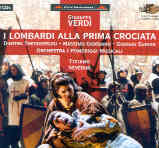It’s been six years since we’ve had a new recording of this, Verdi’s fourth opera, and it’s most welcome. The most recent starred Pavarotti in what possibly was his last really good performance, with June Anderson and Samuel Ramey. Prior to that was a 1972 set with Domingo, Christina Deutekom, and Ruggero Raimondi, which also was quite good. This new release, taped live in November, 2001 in Cremona, Italy, has great energy and some fine performances.
Primary in the “plus” column is the Giselda of Dimitra Theodossiou, a Greek soprano who impressed last year as Anna Bolena on this label’s release of that opera. Here, she’s even more in the idiom: Verdi’s early soprano writing looks back to Donizetti and forward to his own later operas, and Theodossiou has just the right weight and temperament. The voice itself is appealing, and a certain acidity that creeps into it at the top at forte doesn’t detract. She sings off the text and has a good sense of Verdi’s long lines. She takes the “Salve Maria” of Act 2 more slowly that I had thought possible, and it’s a tour de force, with soft singing up to a D-flat and a lovely legato. Theodossiou ends the second act with a blazing high C, and in her third-act duet with Oronte manages a nice soft rise to a B-flat. She must be remarkable live–she’s very vivid even on recordings.
Oronte is the tenor Massimi Giordano, and while neither Pavarotti nor Domingo need fear, he’s good enough. His is a genuinely Italianate sound, he has a terrific rhythmic spring to his second-act cavatina, and he holds his own in duets and ensembles. The top of the voice is a bit wiry, he aspirates vowels, and I wouldn’t want to live with his high C (in the cabaletta after the aria) too long or often, but he’s an asset nonetheless. If he overemotes at times, well, it’s better than sounding bored.
Giorgio Surian’s Pagano/Hermit, while no match for either Ramey or Raimondi, is still venerable. At times the voice sounds worn; at others it’s rich and full. The famous trio for the three leads that closes Act 3 is just wonderful. The fact that there’s an audience seems to help the whole cast–this is a truly red-blooded performance. The rest of the soloists are good; the chorus, which has plenty to do, is well-trained and rehearsed; and the smallish orchestra, rather than sounding undernourished, plays so well that we can clearly hear Verdi’s fine woodwind writing. We can assume that conductor Tiziano Severini is largely responsible for the set’s success.
The recording is as clear as a bell and balances are surprisingly good. So–this set has a better soprano than the other two, Pavarotti wins with Decca, and Raimondi beats the competition on Philips. What to do? Without true “stars” this set makes a good case for the opera, but fans of the rival sets’ singers will need them as well.
































